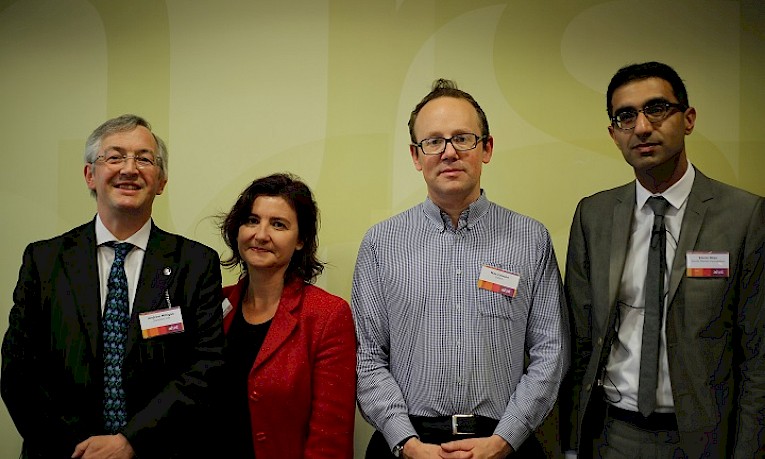01 June 2015
SBE Debate on Inequality
Professor Ozlem Onaran, University of Greenwich
Max Lawson, Oxfam
Emran Mian, Social Market Foundation
The SBE’s Andrew Milligan (Standard Life Investments) chaired this lively evening session on the issue of inequality, the debate kicking off with Prof. Onaran’s (University of Greenwich) analysis of the fall in the labour share of national income among developed economies. The fall has been underway for the past four decades, declining in the EU from 74% in the mid-1970s to 67% currently. Prof. Onaran considered two theories. The neoclassical explanation suggests rising investment as a consequence of a higher profit share, though that ignores wages as a source of demand. The post-Keynesian view addresses this with a dual role for wages - both as both a cost of doing business and a key element of demand.

The impact of a falling labour share would be positive for growth only if countries are ‘profit-led’, but negative if ‘wage-led’. Her findings supported the latter: “planet earth is wage-led, unless we trade with Mars”. She found that the bulk of developed economies, including Germany, France, Italy, the US and UK, were wage-led, while a number of emerging markets with dominant export sectors were profit-led (China, South Africa & India, for example). As for the EU, a 1% fall in labour share here was found to negatively impact GDP growth by around 0.25%. As a result, a reversal in the fall in labour share would be positive for growth, according to Prof. Onaran.
Max Lawson from Oxfam spoke next, beginning by highlighting some dramatic within-country statistics on inequality - from wealth distribution in India to variations in life expectancy/child poverty along London’s tube lines. His primary contention was that, while in-country inequality was rising (the vast improvement in global inequality was taken up in the Q&A following the speakers’ prepared remarks), redistribution could be achieved without necessarily harming economic growth. Some Latin American countries have gone some way towards moving in this direction over the past decade.
One problem related to the concentration of wealth, according to Mr Lawson, is that it is being used to influence the political process in favour of the owners of that wealth. In turn this can lead to a vicious cycle which may be difficult to break. His conclusion? Countries need to raise taxes and spending on services for everyone, and pointed to Brazil’s minimum wage policy as a success story and a model for other countries to adopt. Brave governments - like those in Latin America - can reduce inequality at the same time as raising growth, a model Mr Lawson would like to see applied in the likes of China.
Last but not least, Emran Mian from the Social Market Foundation considered the issue of why rising inequality had not been effectively addressed by successive governments. His line of thought started with the contention that people generally do not appreciate the scale of the problem. When asked to identify levels and changes in inequality, respondents to polls did little better than a random guess. In other words, the level of understanding about inequality in the country where people live is relatively poor. There also seemed to be little correlation between the extent of inequality in a country and people’s support for redistributive taxes.
With people’s views seemingly so far off the mark, Emran’s solution would be to target politicians rather than attempt to change public opinion. In this respect, he argued it was important to show that inequality can cause lower growth. However, the typical mechanism by which this occurs - underinvestment in human capital - is challenging to argue for the UK given Emran’s view of impressive investment in higher education over the past few decades. Government apprenticeship programmes, however, were not the right response according to Mr Mian - after all, he argues, the record of employment subsidies has been poor.


